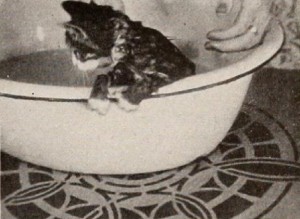
"Every movie maker who owns a kitten probably has tried to film it; and, if so, he knows what a difficult task it is. Walter Bergmann has recorded, on film, incidents in the life of a stray kitten that is adopted by a soft hearted family. Reaction shots of a wise and dignified old cat express the disdain with which it views the foolish antics of the kitten, especially when the latter satisfies its curiosity about high places. Human beings in the film are introduced logically and unobtrusively, but Squeaky is essentially concerned with the star actor. Mr. Bergmann may be pardoned for occasional uneven exposure, for he has produced a film that will delight everybody, and especially those who love cats." Movie Makers, Dec. 1945, 496.
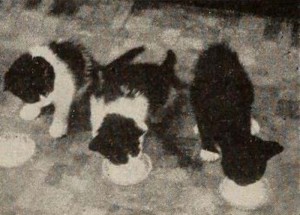
"Last year's Honorable Mention Squeaky has grown up into a Ten Best and has had kittens to boot. In Squeaky's Kittens, Walter Bergmann presents the mother cat rearing her four lively offspring with the help of the Bergmann household. With what must have taken a great deal of patience and dexterity, the kittens are shown being fed and playing and sparring in typical fashion. Their inevitable disposal among the neighbors constitutes a delightful sequence in which the children and grownups of a suburban community are depicted in wholly natural and pleasing manner. Mr. Bergmann's manipulation of lighting, both interior and exterior, is warm and skillful, and he has supplemented the story with titles in light vein that are inserted with restraint." Movie Makers, Dec. 1946, 486.
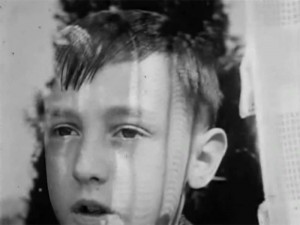
"In a few days of doldrums before being called for training in the Army Signal Corps, David S. Bradley, presiding genius of Bradley Productions, scenarized, cast, costumed, filmed and directed a screen version of Sredni Vashtar, a short story by Saki. running 800 feet of 16mm. monochrome, the picture is the eighth in the series to be produced by this unusual amateur unit of Winnetka, Ill. having been directly preceded by Peer Gynt and Oliver Twist. It will be Mr. Bradley's last production until after the war. Working with him on Sredni Vashtar was John Jameson, assistant director, with the small cast played by Mrs. Herbert Hyde, Lucielle Powell, Lois Northrop and Reny Kidd, all Bradley Production veterans", Movie Makers, Apr. 1943,158.
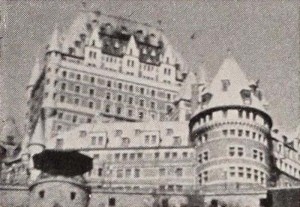
"When you ramble about on a cinematic tour of old Quebec in Carl Nerish's St. Lawrence Sketches, you feel that here at last is a new and different theme for the travel film. The Old World atmosphere of that delightful city is shown with loving sympathy. One of the outstanding points is a clever and human continuity device employed to carry the story along during a tour of the city in a horse drawn carriage. Spoken titles are used with striking closeups of the quaint cab driver who is pointing out the sights to Mr. Nerish and his audience. By studying each shot of the driver, Mr. Nerish was able not only to present a varied series of shots of him, but also to show enough background material to add a good deal to the scenes presented in the regular course of the film. Equally effective are the shots of people in the market place, where a telephoto enables Mr. Nerish to get unposed views. A carefully chosen, but somewhat detailed, musical background was played throughout the film, and it served in no small measure to lend atmosphere to the production. Special credit is due the filmer for his precisely executed titles. Such painstaking work as that involved in centering and lining up movable title letters is seldom seen." Movie Makers, Dec. 1939, 632.
"This story of a loaf of bread begins with the plowing of the ground. It continues thru discing and harrowing. Then come fields of waving wheat; the harvest and the threshing; the journey to the grain elevator and the flour mills. Scenes in a modern bakery follow and from there the bread is sent to the retail store. Children eating bread and jam are representative of the 'ultimate consumer'." Educational Film Catalog, 1937 edition, 80.
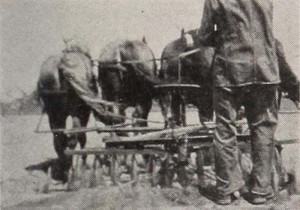
"Good organization of material and excellent photographic presentation of a familiar story make The Staff of Life, by Jack L. Krapp, an attractive and interesting film. Mr. Krapp has an eye for beauty in everyday subjects, and his progressive story of raising, harvesting and milling wheat leaves no detail uncovered in its searching, yet interesting story. Baking procedures are equally thoroughly covered, all in competent cinematography. For those who feel handicapped when working in 8mm., this film would be an inspiration, for certainly one is conscious of no limitation. A noteworthy feature is the clean cut handling of the titles." Movie Makers, Dec. 1939, 636.
"This film captures (in excellent pre-war Kodachrome) a day in the life of Stanley Park. An early effort at independent documentary production by a group of Vancouver film enthusiasts, including amateur cinematographers Oscar Burritt and Don Lytle. The Coast Films group intended to produce a series of films that could be distributed by the fledgling National Film Board of Canada, but World War II intervened, and this was their sole group effort. Stanley Park was restored in 1987 by the British Columbia Archives." (BC Archives)
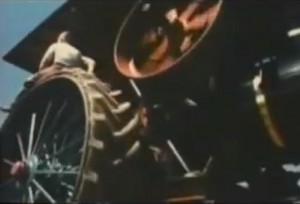
"Those sensual machines, steam tractors, reveal a remarkable ability to perform to music." Canadian Filmmakers Distribution Centre.
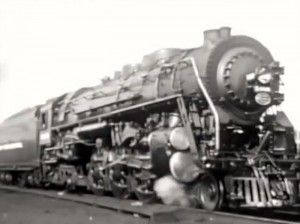
"The Steam Locomotive, second release in the Know Your Railroad series, sponsored and produced by the Motion Picture Bureau of the New York Central System, is a worthy successor in this intelligent line of educational films. In it, Frederick G. Beach, supervisor of the bureau, has set forth in clean cut cinematography the design, construction, operation and maintenance of the famous Hudson type locomotive. An animated model of a steam cylinder explains the otherwise hidden functions of this key piece of machinery, while a soundly conceived narrative points up the film's visual teaching throughout. A stirring sequence showing these great coal eating giants at their daily tasks brings the picture to a dramatic close." Movie Makers, Dec. 1944, 495.
Total Pages: 299